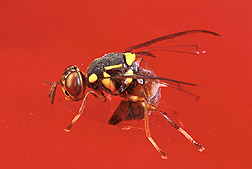This page has been archived and is being provided for reference purposes only. The page is no longer being updated, and therefore, links on the page may be invalid.
New Lure May Help Foil Fruit Fly PestBy Marcia WoodSeptember 29, 1999 A new lure developed at the Agricultural Research Service may help stop the spread of the Malaysian fruit fly, a housefly-size pest of crops like peppers, tomato, eggplant, cucumber and gourds. The lure can be easily applied to wicks like those used in standard insect traps. Traps holding wicks treated with the new blend could be used in detection programs in states such as California. There, pest control workers monitor traps year-round to detect outbreaks of other insect species before they build up. A relative of the infamous Mediterranean fruit fly, the Malaysian fruit fly or Bactrocera latifrons is now established on all major islands in Hawaii. If undetected in contraband produce, it could hitchhike to the continental U.S. and pose a considerable threat to mainland agriculture. The insect is native to southern and southeastern regions of Asia. The new lure was developed by ARS researchers in Hilo, Hawaii, and Albany, Calif. The agency-- the chief research wing of the U.S. Department of Agriculture--is seeking patent protection for the lure. The lure is easy to make and doesn’t require solvents or additives. It combines a colorless chemical called alpha-ionol and cade oil. The oil is a dark-brown liquid extracted from prickly juniper, Juniperus oxycedrus. Earlier, ARS scientists in Hawaii and Maryland patented alpha-ionol as a Malaysian fruit fly lure. Now, ARS experiments in Hawaii have shown that cade oil makes the lure more effective. The experiments used more than 1 million laboratory-reared Malaysian fruit flies, according to Grant T. McQuate at the ARS U.S. Pacific Basin Agricultural Research Center in Hilo. An article in the September issue of ARS' monthly journal, Agricultural Research, tells more. See it on the World Wide Web at: /is/AR/archive/sep99/lure0999.htm Scientific contact: Grant T. McQuate, ARS U.S. Pacific Basin Agricultural Research Center, Hilo, Hawaii, phone (808) 959-4300, fax (808) 959-4323, mcquate@aloha.net. |

